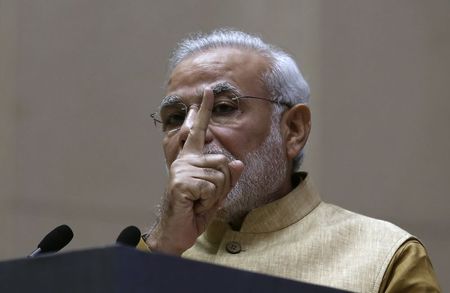By David Brunnstrom
WASHINGTON (Reuters) - The U.S. business lobby on Thursday questioned the reformist credentials of new Indian Prime Minister Narendra Modi, on the eve of his visit to the United States in which he will encourage investment and declare India open for business.
The U.S. Chamber of Commerce and 15 other U.S. business associations representing sectors ranging from agriculture to movie making, pharmaceuticals and telecoms, called on President Barack Obama to press Modi to remove barriers to fair trade when the two leaders meet in Washington on Monday and Tuesday.
"Since taking office, Prime Minister Modi has declared India 'open for business' and promised to incentivize investment and 'give the world a favorable opportunity to trade with and produce in India,'" the Alliance for Fair Trade with India said in a letter to Obama.
"Thus far, however, the new Indian government has produced troubling policies of its own," the group said, adding: "These actions send perplexing and contradictory new signals about India's role in the global marketplace."
The letter highlighted India's blockage of a key World Trade Organization agreement reached in Bali last year, which overshadowed a July 30-Aug. 1 visit to India by U.S. Secretary of State John Kerry.
The business alliance also complained about India's raised tariffs and "burdensome" new testing requirements on imported information and communication technology products.
U.S. officials say the United States will press Modi to end the WTO blockage during his visit, something that could dampen the mood of a trip aimed at revitalizing a strategic relationship Washington sees as a key counterbalance in Asia to an increasingly assertive China.
Also on Thursday, U.S. Congressional leaders dealing with trade and finance wrote to the U.S. International Trade Commission calling for a second investigation into India's "unfair" trade practices, detailing any changes under Modi. They called for the ITC to deliver a report to Congress on Sept. 24, 2015, a statement said.
A report requested in August last year is due to be delivered to Congress on Dec. 15 this year.
Stephen Ezell, senior trade policy analyst at the Washington based Information Technology & Innovation Foundation, told a teleconference that Modi had taken some positive steps, including an easing of some restrictions on investment in the defense, insurance and railway sectors.
"However ... we've also seen the continuation of existing —and even the promulgation of some new — trade-distorting policies that do give us some pause," he said.
Chris Moore, of the National Association of Manufacturers, said Modi and his administration were "saying positive things."
"But their actions tell a different story."
Patrick Kilbride, of the U.S. Chamber of Commerce, welcomed the Indian government's plans to review the environment for intellectual property rights, but said it remained "very poor."
The chamber would take the pledges at face value, he said, but added: "Recent history has given us many reasons to be wary."
Modi is due to arrive in the United States on Friday for his first visit as prime minister and has meetings scheduled with 17 U.S. corporate chiefs including those of Google, IBM, GE , Goldman Sachs and Boeing.
Analysts say maintaining a positive mood will be important during the visit, given that Modi was denied a U.S. visa in 2005 after more than 1,000 people, most of them Muslims, were killed in riots in the state he governed.

There was no immediate comment from the Indian embassy in Washington on the letter from the U.S. business lobby.
(Reporting by David Brunnstrom; editing by Andrew Hay)
